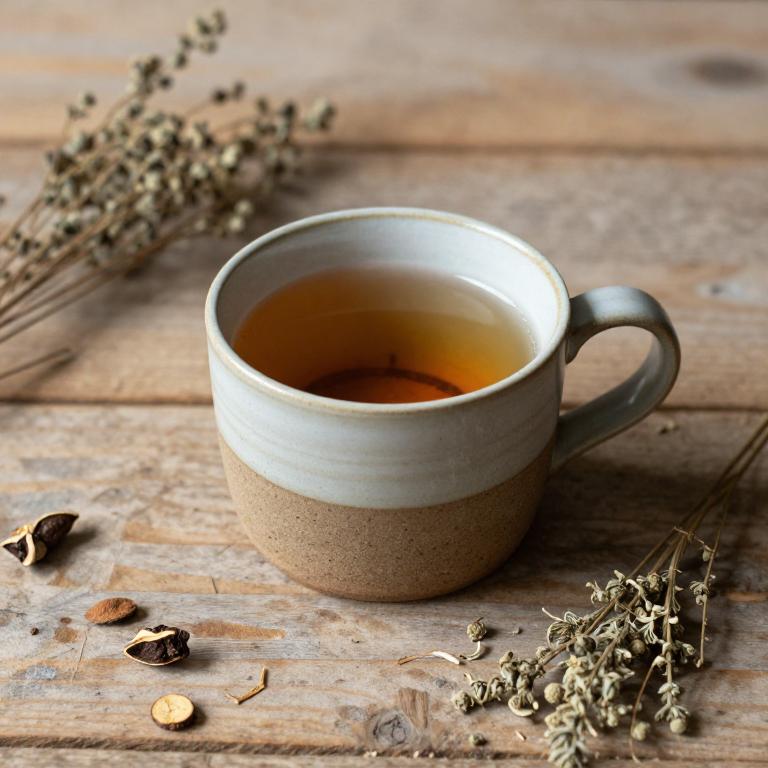10 Best Herbal Teas For Osteoarthritis

Herbal teas have gained popularity as a natural remedy for managing the symptoms of osteoarthritis, offering a gentler alternative to pharmaceutical treatments.
Commonly used herbs such as ginger, turmeric, and boswellia are known for their anti-inflammatory and pain-relieving properties, which may help reduce joint swelling and discomfort. These teas can be easily prepared at home using fresh or dried herbs, making them a convenient and cost-effective option for many individuals. However, it is important to consult with a healthcare provider before incorporating herbal teas into a treatment plan, as they may interact with medications or have side effects in certain individuals.
While herbal teas may provide some relief, they should be used as part of a holistic approach that includes lifestyle changes and medical guidance for optimal results.
Table of Contents
- 1. Turmeric (Curcuma longa)
- 2. Ginger (Zingiber officinale)
- 3. Salvia (Salvia officinalis)
- 4. Common grape (Vitis vinifera)
- 5. Echinacea (Echinacea purpurea)
- 6. Licorice (Glycyrrhiza glabra)
- 7. Ceylon cinnamon (Cinnamomum verum)
- 8. Stinging nettle (Urtica dioica)
- 9. Thistle (Silybum marianum)
- 10. Dog rose (Rosa canina)
1. Turmeric (Curcuma longa)

Curcuma longa, commonly known as turmeric, has been widely used in traditional medicine for its anti-inflammatory and antioxidant properties, making it a popular ingredient in herbal teas for managing osteoarthritis.
The active compound in turmeric, curcumin, helps reduce joint inflammation and pain by inhibiting pro-inflammatory cytokines and enzymes such as COX-2 and LOX. Herbal teas made from turmeric can be a natural and soothing way to support joint health, often combined with other herbs like ginger or black pepper to enhance absorption and effectiveness. Regular consumption of turmeric tea may help alleviate symptoms of osteoarthritis, though it should complement, not replace, conventional medical treatments.
Overall, curcuma longa herbal teas offer a promising complementary approach to managing osteoarthritis through their therapeutic and anti-inflammatory effects.
2. Ginger (Zingiber officinale)

Zingiber officinale, commonly known as ginger, has been widely used in herbal teas for its potential anti-inflammatory and pain-relieving properties.
Research suggests that ginger may help reduce joint inflammation and alleviate symptoms associated with osteoarthritis by inhibiting the production of inflammatory compounds in the body. When consumed as a herbal tea, ginger can provide a mild and soothing effect, making it a natural alternative for those seeking relief from joint discomfort. However, while it is generally safe for most people, individuals with gastrointestinal sensitivities or those on blood-thinning medications should consult a healthcare provider before use.
Incorporating ginger tea into a holistic approach that includes diet, exercise, and other complementary therapies may enhance its benefits for managing osteoarthritis.
3. Salvia (Salvia officinalis)

Salvia officinalis, commonly known as sage, has been traditionally used in herbal medicine for its potential anti-inflammatory and antioxidant properties.
Recent studies suggest that sage tea may help reduce joint inflammation and pain associated with osteoarthritis by inhibiting inflammatory markers such as COX-2. The essential oils and flavonoids present in sage leaves contribute to its therapeutic effects, supporting joint health and mobility. While more research is needed, many individuals report relief from symptoms after incorporating sage tea into their regimen.
As a complementary therapy, salvia officinalis herbal tea may offer a natural alternative or adjunct to conventional treatments for osteoarthritis.
4. Common grape (Vitis vinifera)

Vitis vinifera, commonly known as grapevine, has been traditionally used in herbal medicine for its potential anti-inflammatory and antioxidant properties.
Herbal teas made from Vitis vinifera, particularly the leaves and seeds, are believed to support joint health and may help alleviate symptoms of osteoarthritis by reducing inflammation and oxidative stress. These teas are often prepared by steeping dried leaves or seeds in hot water, and they may contain compounds such as resveratrol, which has shown promise in studies related to joint protection. While some preliminary research suggests benefits, more clinical trials are needed to confirm their efficacy for osteoarthritis.
As with any herbal remedy, it is advisable to consult a healthcare professional before incorporating Vitis vinifera tea into a treatment plan for osteoarthritis.
5. Echinacea (Echinacea purpurea)

Echinacea purpurea, commonly known as purple coneflower, is a popular herbal remedy often used in teas to support immune function and reduce inflammation.
While it is traditionally associated with colds and flu, some studies suggest that its anti-inflammatory properties may offer potential benefits for conditions like osteoarthritis. The active compounds in echinacea, such as alkamides and polysaccharides, are believed to modulate the immune system and reduce joint inflammation. However, more rigorous clinical trials are needed to confirm its effectiveness specifically for osteoarthritis.
As with any herbal supplement, it is advisable to consult a healthcare provider before use, especially for individuals with chronic conditions or those taking other medications.
6. Licorice (Glycyrrhiza glabra)

Glycyrrhiza glabra, commonly known as licorice root, has been traditionally used in herbal medicine for its anti-inflammatory and antioxidant properties, which may offer benefits for individuals with osteoarthritis.
Studies suggest that compounds in licorice root, such as glycyrrhizin and flavonoids, can help reduce joint inflammation and pain by inhibiting pro-inflammatory cytokines. When consumed as a herbal tea, glycyrrhiza glabra may support overall joint health and alleviate symptoms associated with osteoarthritis. However, it is important to consult with a healthcare provider before using licorice root, as it can interact with certain medications and may cause side effects in high doses.
Despite its potential benefits, licorice root should be used as a complementary therapy rather than a replacement for conventional treatments.
7. Ceylon cinnamon (Cinnamomum verum)

Cinnamomum verum, commonly known as true cinnamon, has been traditionally used in herbal teas for its potential anti-inflammatory and antioxidant properties.
These properties may help reduce joint inflammation and pain associated with osteoarthritis. Studies suggest that the active compounds in cinnamon, such as cinnamaldehyde and polyphenols, can inhibit inflammatory pathways in the body. While more research is needed, some individuals report relief from osteoarthritis symptoms when consuming cinnamon-infused teas regularly.
As a complementary therapy, cinnamon tea may be a safe and natural option to support joint health when used alongside conventional treatments.
8. Stinging nettle (Urtica dioica)

Urtica dioica, commonly known as stinging nettle, has been traditionally used in herbal medicine for its potential anti-inflammatory and analgesic properties.
When brewed into a tea, it may help alleviate symptoms of osteoarthritis by reducing inflammation and pain in the joints. The leaves of the plant contain compounds such as flavonoids and polyphenols, which are believed to contribute to its therapeutic effects. Some studies suggest that regular consumption of stinging nettle tea may support joint health and improve mobility in individuals with osteoarthritis.
However, it is important to consult with a healthcare professional before using it as a complementary treatment, especially for those with existing medical conditions or taking other medications.
9. Thistle (Silybum marianum)

Silybum marianum, also known as milk thistle, is a herbal remedy that has been studied for its potential benefits in managing osteoarthritis.
The active compound, silymarin, is believed to have anti-inflammatory and antioxidant properties that may help reduce joint inflammation and pain. While research on its direct effects on osteoarthritis is limited, some studies suggest that silymarin may support overall joint health by protecting cartilage from oxidative damage. Herbal teas made from silybum marianum are often consumed as a natural alternative or complement to conventional treatments.
However, individuals should consult with a healthcare provider before using milk thistle, as it may interact with certain medications and is not a substitute for professional medical advice.
10. Dog rose (Rosa canina)

Rosa canina, also known as rose hip, is a traditional herbal remedy that has been used for centuries to support joint health and alleviate symptoms of osteoarthritis.
The tea is made from the dried fruits of the rose plant, which are rich in bioactive compounds such as flavonoids, polyphenols, and vitamin C, all of which have anti-inflammatory and antioxidant properties. These components may help reduce inflammation and pain in the joints, making rosa canina tea a natural option for managing osteoarthritis symptoms. Studies suggest that regular consumption of rose hip tea may improve mobility and slow the progression of joint degeneration.
However, it is advisable to consult a healthcare professional before incorporating it into a treatment plan, especially for individuals with existing medical conditions or those taking medications.